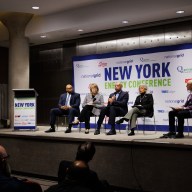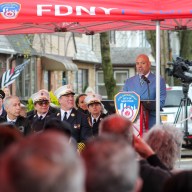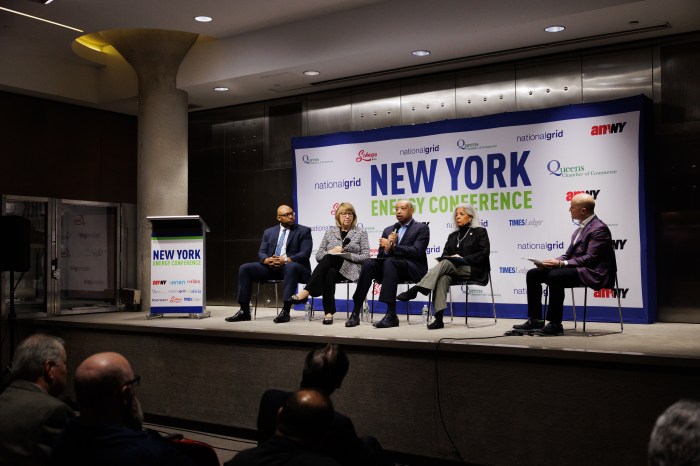By Chris Fuchs
The Center for the Community Interest maintains Jin Rong Lee, 46, may have been killed in the lobby of his Flushing apartment building on 147th Street near 35th Avenue as part of a gang initiation rite, although police have not established that link.
Members of the group and Councilmen John Sabini (D-Jackson Heights) and Michael Abel (R-Bayside) told a City Hall news conference that the bill, introduced during a Nov. 15 City Council session, would give the police the authority to force loiterers off the streets or face a fine or imprisonment.
“As recent incidents demonstrate, criminal gangs remain an ominous presence on the streets of New York,” Sabini said. “Law enforcement needs better tools in order to release communities from the grip of street gangs. This common-sense legislation will meet that need.”
Lee's family stood on the steps of City Hall as the executive director of the group, Dennis Saffran, explained the legislation.
Lee, a worker at a Korean restaurant in Manhattan, was returning from work at 1 a.m. Sept. 23 when he was attacked with a cobblestone by two teenagers in the lobby of his apartment building, the police said.
Although a graffiti tag of an El Salvadorian gang had been found scrawled on the outside of the apartment building, the police have not linked the crime to a gang initiation, said Detective Robert Samuel, a police spokesman. The suspects were captured on a grainy, black-and-white videotape, the police said, but no one has been arrested and charged in the murder.
While cautioning that the gang-initiation link was inconclusive, the group and the councilmen used the Lee murder as a springboard to tout the merits of the proposed legislation.
The group said the bill is modeled after one adopted in Chicago that was enacted in March . That bill was a compromise after the Chicago courts struck down an initial anti-loitering law, in a 5-to-4 ruling, that they deemed too vague, Saffran said.
If the New York bill is passed and signed into law, it would give police the authority to break up groups, in particular, identifiable gang members, who try to assert control over a public area, intimidate people entering that area or conceal illegal activity, Saffran said. Before the police make an arrest, he said, they would have to give the loiters a chance to explain what they were doing. Anyone arrested under the proposed law could be fined or imprisoned for up to 15 days.
But City Councilman Sheldon Leffler (D-Hollis), the chairman of the Committee on Public Safety, said that because anti-loitering laws tend to be a constitutionally delicate issue, he would not express his support or disapproval of the bill until he gave it a finer read.
“The simple act of loitering has been found time and again not to be a crime,” Leffler said in a phone interview. “Even if you're a street gang member, you can loiter. Frequently you get legislation that is designed to make a splash or is backed by people who don't recognize the complexity of the cases involved in this area.”
Leffler said another group had lobbied the City Council several years ago to enact anti-loitering laws with its focus directed on loiterers near Northern Boulevard and 147th Street, a block away from where Lee was murdered.
Norman Siegel, the executive director of the New York Civil Liberties Union, said he has concerns about the bill and plans to testify about them at a City Hall hearing when one is held.
“The proposal is fraught with constitutional and civil liberties problems,” he said. “Under our constitutional system, people have a right to be on the streets, to congregate in public spaces, regardless of who they are. What they don't have a right to do is to engage in criminal activities. So you arrest someone for their conduct not for their status.”
In an interview with the Times-Ledger last month, Bo-Young Lee, 17, the eldest daughter of Jin-Rong, said clusters of teenagers mill about on 147th Street near 35th Avenue – the corner where their apartment building sits – in Flushing late at night and on weekends. Her mother has set an early curfew for all her children of 8 p.m.
“Why are they attacking Korean people?” she said. “Because they are weak, they don't have power, some of them don't have green cards, they don't speak English?”





























